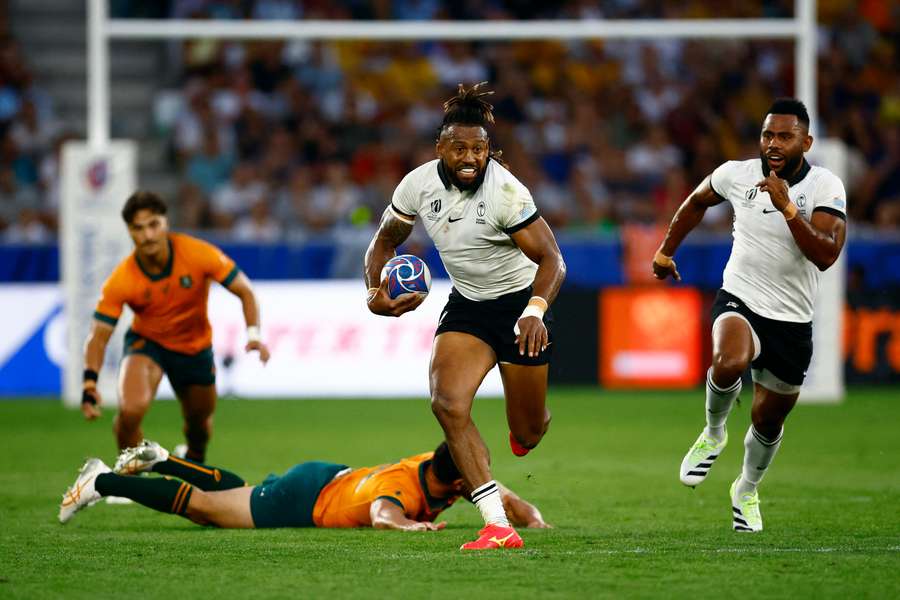Fijian rugby gets its golden moment as Wallabies outfought and outclassed

A quick glance at the history books highlighted the magnitude of the task facing Simon Raiwalui’s side as they prepared for a do-or-die clash with the Wallabies.
A record of two wins in 22 tests between the two nations did little to inspire hopes of a Fijian upset, although recent success in the Pacific Nations Cup as well as a dazzling pre-tournament win over England provided proof of Fiji’s credentials on the world stage.
And so it proved on a historic night in Saint-Etienne, as Fiji - fuelled by the heartache of Semi Radradra’s late spill against Wales - delivered an exceptional all-round performance, beating Australia 22-15 for their first victory over the southern hemisphere side since 1954.
Tactical masterclass
Famed for being rugby’s greatest entertainers with their expansive style of play and brutal physicality, Fiji adopted a more traditional approach against the Wallabies, combining their usual flair and bulldozing carries with rock-solid defence and excellent set-piece play.
Game intelligence is a side of Fijian rugby that’s improved significantly under Raiwalui in recent months and the benefits of that were on full display. They squeezed the life out of Australia at the breakdown, earning penalties with such frequency that Eddie Jones’ side were never able to compose themselves and settle into a rhythm at the ruck.
The Pacific champions showed discipline, composure and sharp decision-making from the first minute until the last - qualities that have often been the downfall of Fijian rugby in previous regimes. They didn’t just outrun Australia, they played with a clear strategy and identity that suffocated their opponents.
Star players Levani Botia (34) and Josua Tuisova (29) were relentless on the night, with the latter’s well-taken try at the start of the second half proving decisive, while young scrum half Simione Kuruvoli (24) was faultless from the tee, nailing all five of his kicks. It was a tactical masterclass from the Flying Fijians - typified by the kicking battle they won in the closing stages to effectively clinch victory.
Australian struggles continue
For all Fiji’s brilliance, an inexperienced Australian side were there for the taking as they failed to convert their brief spells of pressure into points. Having suffered five consecutive defeats coming into the tournament, the Wallabies’ frailties were exposed time after time by Fiji’s athleticism in the field and physicality at the breakdown.
The Wallabies lacked both cohesion and composure in the critical moments. Good work on the ground would precede a careless knock-on, while line-breaking carries would invariably amount to nothing as the necessary support at the ruck failed to arrive in time.
The absence of injured duo Will Skelton (31) and Taniela Tupou (27) was significant for Australia, who desperately missed their quality at the scrum. Furthermore, Jones’ decision to opt for youth rather than experience will surely come under scrutiny, with Michael Hooper and Quade Cooper among several veterans left out of Australia’s youngest World Cup squad in 20 years.
It’s clear the Wallabies have one eye on the future with the next World Cup being held on Australian shores, but several players looked out of their depth against an experienced Fijian side. The substitution of young fly-half Carter Gordon (22) on 50 minutes after his costly misjudgement for Tuisova’s try was a particularly damning statement from the Wallabies’ coaching team.
Implications for Pool C
Fiji’s first-ever World Cup win over Australia has blown Pool C wide open. Both sides are locked together on six points after two matches, with Fiji above the Wallabies thanks to their head-to-head record. What’s more, the Flying Fijians have the easiest route through the pool to the knockout stages, facing Georgia and Portugal in their final two group games.
Meanwhile, Australia - who were fortunate to pick up a priceless bonus point after Frank Lomani’s last-minute penalty miss - must now prepare for a blockbuster clash against Wales in Lyon on Sunday.
Warren Gatland’s side sit top of the pool with a maximum 10 points from their opening two matches, but there’s still plenty of jeopardy over their place in the quarter-finals.
The Wallabies need a win to avoid becoming the first Australian side to miss out on the knockout stages, while Wales can’t afford to leave Lyon empty-handed.
Failure to pick up at least a losing bonus point would likely see Wales squeezed into third place in the final reckoning, so it promises to be a fascinating conclusion to Pool C.
